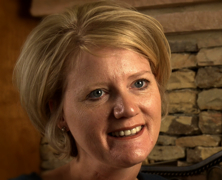 Stephanie Zimmerman has been featured in two previous posts. In a June 2016 post called, “After Cancer Treatment: Living Out the Cure,” Stephanie shared her experiences as a survivor of childhood cancer, specifically her experience of long-term side effects of cancer treatment. In a subsequent post, Stephanie @KindredBelle shared her advice on advocacy (along with Kathleen Thompson, MD, a physician specializing in pharmaceutical drug research in the UK) in a post called “How Do I Advocate For Myself?” Here Stephanie shares how she has created a healthcare team to maximize her treatment.
Stephanie Zimmerman has been featured in two previous posts. In a June 2016 post called, “After Cancer Treatment: Living Out the Cure,” Stephanie shared her experiences as a survivor of childhood cancer, specifically her experience of long-term side effects of cancer treatment. In a subsequent post, Stephanie @KindredBelle shared her advice on advocacy (along with Kathleen Thompson, MD, a physician specializing in pharmaceutical drug research in the UK) in a post called “How Do I Advocate For Myself?” Here Stephanie shares how she has created a healthcare team to maximize her treatment.
Guest Post by Stephanie D. Zimmerman, MSN
Every person with an ongoing complex medical history needs the benefit of a multidisciplinary ‘dream team.’ Sadly, it’s easier said than accomplished. Additionally, every individual needs to serve as their own best, strongest advocate: the CEO of their health and wellbeing. This may seem like an overwhelming task; however, I’d like to share with you how I, a childhood cancer survivor and a heart transplant recipient, have approached building my dream team over the years.
Since I also spent my professional life as a pediatric oncology nurse practitioner, I’m certain you can appreciate that I also carry the risk of being labeled ‘THAT’ patient: the manipulative, self-appointed expert who is beyond difficult to work with and to be avoided at all cost.
First Steps To A Multidisciplinary Healthcare Dream Team
The first, and in my opinion, most important aspect of building a dream team is to know your diagnosis, your needs and your goals. I have been a student of myself, my medical and surgical history, AND my wellness since my teenage years when I realized that I carried lifelong risks and potential threats, with regard to my health and wellness.
*For the purposes of this post, I use myself as an example:
![]() Based on my past medical history, I created a list of specialists that may be needed in the future. I call this group of providers my special teams:
Based on my past medical history, I created a list of specialists that may be needed in the future. I call this group of providers my special teams:
- Transplant Cardiology
- Dermatology
- OB/GYN
- Infectious Disease
- Pulmonology
- Gastroenterology
- Urology
- Psychiatry
![]() I believe it is wise to discuss with one’s primary care provider her/his recommendations within each specialty.
I believe it is wise to discuss with one’s primary care provider her/his recommendations within each specialty.
My Primary Care Provider [PCP] serves as my quarterback. We share the role of head coach in directing my care. We both have a strong sense of the limits of our expertise and we bring in our special teams as needed.
I will tell you that my PCP is second to none; she was not familiar with the potential late effects of cancer treatment among adult survivors of childhood cancer; however, she was willing to learn from me and that has made all the difference in the world.
Meet And Greet With Specialists
Based on your PCP’s recommendations, the burden is yours to make ‘meet, greet and get-to-know you’ appointments with the specialists to determine if they are a right fit for your team.
Note: Some will be and some won’t be. Be okay with that reality.
Be Prepared
Tip: Take a complete summary of your past medical history with you to your interview.
I have a complete past medical history that includes my cancer treatment [and] heart transplant history that I send ahead of my appointment. In addition, I hand carry 2 copies to the appointment knowing that it is unlikely that the provider will review it before meeting with me.
Within the body of this document, my cancer treatment history details chemotherapeutic agents and radiation received, including cumulative doses and potential late effects to be that require screening.
Know how much time has been allotted for your meet and greet.
Having this information beforehand will make it easier to do step #3.
Have a list of questions with you.
Questions I’ve Asked
1) Why did you go into medicine?
2) Why have you stayed in medicine?
3) How long have you been practicing in the local area?
4) Do you enjoy individuals with complex cases?
5) Have you ever cared for someone similar to me?
6) Is there anything about me or my case that intimidates you?
7) Are you comfortable with me participating in the decision making process?
8) Access: how easy or difficult will it be for you to gain accessibility to her/him?
Research
Do your research before each meeting. Know the provider you are going to interview. Study their bio sketch, their area of expertise, their practice website, their Healthgrades, their record with the Board of Medicine.
Be Observant
Pay attention to body language and the attitude with which each provider answers your questions as these observations may be deal breakers.
Wrap It Up
Should you decide they are a right fit for your team, wrap up the interview by asking if they are willing to be a part of your healthcare team. Let them know that you will call to schedule an appointment for a baseline physical.
Importance of Your Primary Care Provider
I can’t emphasize enough that one’s greatest asset is an exceptional PCP who will not be intimidated by your history or put off by your desire to be active in the decision making process. This means a PCP who will respect you, invest in you, and advocate for you and your best interests. For me, I needed a PCP who was willing to be educated about my treatment and transplant-related risks.
Conclusions
It takes time to build a healthcare dream team; however, it is time well spent. The individuals you invite to be a part of your team are your allies. They will have a significant impact on your health and wellbeing, your level of satisfaction within the healthcare system, and likely, your long-term outcomes.
Take home messages: Be your own BEST advocate! You are the one who is MOST invested in you Do NOT compromise. You and your health is worthy of a multidisciplinary healthcare dream team.





